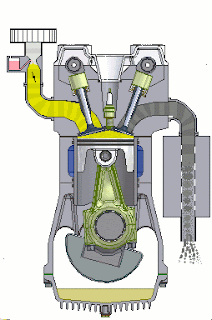 |
| Yo Dawg, Running premium today |
 |
| The 4-stroke engine, in all it's glory. |
Let's take a step back for a second and understand some engine fundamentals. A phenomenon known as 'knock' occurs when the air-fuel mixture in an engine cylinder ignites and begins burning before it should have. In a 4-cycle engine, rapidly expanding gas is used during the power stroke to generate useful work by pushing the piston downward. When knock occurs, the air-fuel mixture spontaneously ignites towards the end of the compression stroke - while the piston is still moving upward. In other words, as the piston is still moving 'up', rapidly expanding combustion gases are trying to force the piston back 'down'. Ouch.
 |
| A confusing array of options for the average consumer. Super must be better, right? |
 |
| Turbocharging, Did someone say 'higher temperature and pressure'? |
"So everyone should just run 93-octane then, right?" Wrong. An engine that was designed to run on 87-octane fuel will actually produce less power with a tank full of 93-octane. The naturally aspirated, low compression engine in your '99 Civic is not taking advantage of running premium fuel by utilizing a higher compression ratio or using turbocharging. You are paying 20 cents more per gallon for less power. The double kick in the pants is that in order to accelerate at the same rate, you will give the motor more throttle resulting in worse fuel economy.
 |
| "Joe told me I could run 87-octane in my 13:1 compression motor" |
On the flip side, a vehicle designed to run on 93-octane premium fuel should not under any circumstances use lower octane gasoline or risk engine knock. While the advent of knock sensors and electronically controlled ignition allow for timing retardation when engine knock is detected; A wide-open-throttle trip to redline will still produce knock and over time result in engine failure.
Vague claims from BP (video link)
Regarding the second point of running premium fuel to take care of your car, this automotive urban legend was propagated with BP fuel commercials starting in the mid-2000s. With vague claims such as 'it helps cars run younger for longer', BP commercials said that their Nitrogen enriched premium gasoline would help clean valves. More bullshit. The fact is that burning gasoline is dirty. Combusting gasoline breaks the complex carbon chains that makeup the fuel and produces carbon deposits, whether the fuel has been 'invigorated with Nitrogen' or not. The key word in the commercial is that it 'may' reduce deposits, but it also 'may not'. It is also funny to note that Nitrogen is largely inert during the normal combustion process (read: it doesn't burn) and that it already comprises 78.084% of the air ingested by your engine, so why add it to the gasoline?
 |
| The Otto Cycle, breaking carbon chains since 1876 |
So the next time someone driving a car designed to run on 87-octane fuel tells you that running 93-octane is improving the power or longevity of their engine, feel free to correct them.
- Axle

No comments:
Post a Comment